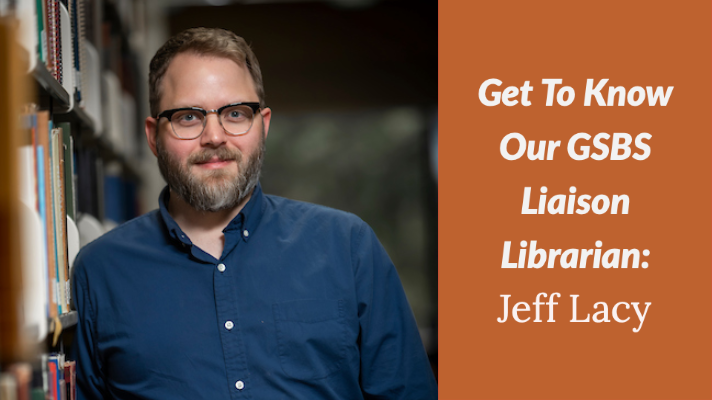Get To Know Our GSBS Liaison Librarian: Jeff Lacy

Tell me about your role at UT Health San Antonio. What do you do as a liaison librarian?
I’m the primary contact for anything library-related for the faculty, students, and staff of the Graduate School of Biomedical Sciences and the School of Dentistry.
In general, I assist with navigating libraries and research databases, conducting literature reviews, applying the principles of evidence-based practice, citing publications, using reference managers like Zotero or Endnote, managing research data, finding outlets for publication, and identifying predatory publishers. Basically, I support virtually anything related to the cycle of scholarly communication: finding, using, or producing information.
What are some resources that the library offers to graduate students?
We provide access to numerous collections of books, journals, research databases, and other research tools. Most of our resources are available online, which is very helpful in times like these!
In addition to our own collections, our interlibrary loan service can borrow those publications we don’t have.
We provide assistance by phone, email, and online chat. Check the library’s website for details.
And, of course, when campus is re-opened, please return to the library! We have a variety of spaces for working alone or with a group. We also have on-site technical resources and services, including computers, printing, a virtual reality rig, and 3D printers.
I know one of the ways you can help students is to create an author ID tied to their name? How would a student do that? Why would that be helpful for them in their academic career?
An author ID is a unique identifier linked to a verified profile. This profile is sort of like a LinkedIn profile, but it traces publication history instead of employment history.
This is helpful because if someone were to search for your publications, they’d be hard pressed to find everything you’ve written. They’d find only those publications available in whichever database they search. If they search PubMed, for example, they’d find different publications than if they searched Google Scholar, Scopus, or Web of Science. Each research database has a different scope, and none are comprehensive. Also, inside each database, authors with similar names are often hard to distinguish.
An author profile allows you maintain a clear and comprehensive publication record in one place. This is particularly useful when applying for grants or looking for collaborators. Some funding organizations ask for author IDs when you apply for funding. Some databases allow you to link your publications to your author ID.
There are a few different author ID registries. ORCID and ResearcherID are probably the most common.
Before deciding on a research topic, students often have to do quite a bit of research. Are there any tips you have for students in the brainstorming stage?

If you’re not sure where the cutting edge of your area of interest is, check out science or health news. These can be special sections or blogs from general news outlets like the New York Times or BBC News, or more specialized reporting from magazines like Popular Science or web sites like Medical News Today. These sources can help you learn about current and impactful studies making waves in the world. The kind of topics that are of interest to the general public, different industries, and funding agencies.
You can also look through recent articles from general science and medical journals like Science, PLOS, JAMA, or the New England Journal of Medicine. Also, almost every academic, scientific, or biomedical specialty has at least one journal dedicated to it. The library provides an app called Browzine for keeping up with new journal issues.
After a student has decided on a topic, what are some tips you have for them in the researching stage?
Think of your topic as a question. Look for information that answers that question. This technique focuses your research into something actionable and prevents you from going too broad.
Try to find a recent review article on your topic. A review should digest and reference other relevant sources. Features in research tools like Pubmed, Cochrane Library, and TRIP make finding reviews easy.
Also try to find highly-cited publications on your topic. Scopus and Google Scholar have features that can help you trace citations.
If the literature can’t answer your question, determine what work needs to be done to make it answerable. That should outline your next steps.
If your specific question has been answered already, find the new, related, unanswered questions that push the topic further.
Now that a student is ready to write, what are some tips that you have for students in the writing stage?
A reference manager is very useful. A reference manager keeps track of publications for you. This is helpful even before you’re ready to write. You can make reading lists or organize publications by topic, class, or project. This makes articles easy to find again.
A reference manager also helps you cite publications. With the right plug-ins, a reference manager embeds citations in documents, builds the works cited list for you, and lets you easily change citation formats.
There are several reference managers available. I’m most familiar with Zotero and Endnote. Zotero is free—Endnote isn’t. Because it’s free, Zotero is a good one to start with, but they both have their strengths. They also both have a learning curve, but the long-term utility is worth it.
Any other questions/tips that you can think of that may be helpful to a graduate student.
Don’t hesitate to ask questions! If you’re getting frustrated, there might be an easier way. Reach out to me or the other support services available on campus.
If a graduate student needed your help, how could they reach you?
Until we return to campus, the easiest way to contact me is by email at lacyc@uthscsa.edu.
